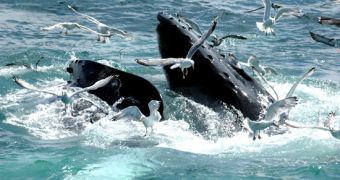Although it may be true that whales are some of the most amazing creatures presently inhabiting our marine ecosystems, the news that efforts to protect them might translate into having to shoot and kill some sea gulls is a rather disturbing one.
However, rumor has it that people living off the Argentinian coast recently noticed that these birds have learned one very peculiar lesson when it comes to getting a few bites to it without going through too much trouble.
Thus, they simply wait for whales to hit the surface, and then scratch them and bite them, hoping to get some pieces of blubber and skin.
For this reason, the case is now made that, because the sea gulls population in this part of the world has significantly increased, it might become necessary to kill several of these birds so as to protect the whales that come to feed in these waters.
However, conservationists warn that seagulls only experienced this boost in their headcount because the garbage left lying around by people, together with the fish constantly thrown away by local fisherman who have no use for it, has provided them with significant amounts of food.
Therefore, rather than killing the birds, it would be recommended to resort to better garbage and fish leftovers management policies.
Ecorazzi reports that Marcello Bertellotti, working with the National Patagonia Center, recently explained how, “It’s not just that the gulls are attacking the whales, but that they’re feeding from them, and this way of feeding is a habit that is growing and becoming more frequent.”
Moreover, “It really worries us because the damage they’re doing to the whales is multiplying, especially to infant whales that are born in these waters.”
One very interesting piece of news is that the province of Chubut, in southern Argentina, has already agreed to OK a so-called “100-day Whale-Gull Action Plan,” whose end goal is that of somewhat putting a leash on the frequency of whales – sea gulls negative interactions.

 14 DAY TRIAL //
14 DAY TRIAL //